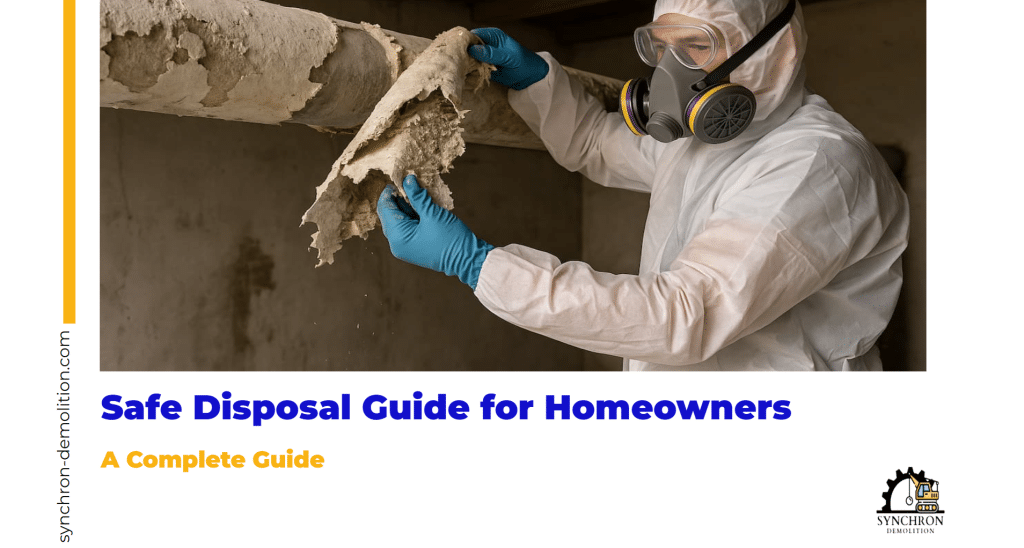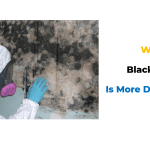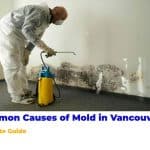Many older homes in Vancouver contain materials that may pose hidden dangers, with asbestos being one of the most concerning. Once considered a miracle building material, asbestos is now recognized as a serious health risk if disturbed. For homeowners planning renovations or cleanouts, understanding how to handle asbestos and other types of waste is essential. Safe disposal not only protects your health but also ensures compliance with local regulations and contributes to a cleaner community. This guide explains how asbestos removal works, what to expect, and how to manage other forms of waste responsibly.
Understanding Asbestos in Vancouver Homes
Asbestos was widely used in building construction throughout much of the 20th century. In Vancouver homes, it can be found in:
- Attic insulation
- Vinyl floor tiles and adhesives
- Textured ceilings
- Drywall compounds
- Roofing shingles and siding
When intact, asbestos is not necessarily harmful. The danger arises when fibers are released into the air during renovation, demolition, or damage. Exposure has been linked to lung cancer, mesothelioma, and other respiratory illnesses. For this reason, the province of British Columbia enforces strict regulations regarding asbestos handling and disposal. Homeowners are encouraged to test suspect materials before starting any renovation project.
Professional Asbestos Removal Process
Removing asbestos is not a do-it-yourself task. An asbestos removal company with licensed professionals follows a step-by-step process to ensure safety:
- Inspection & Testing: Specialists collect samples from suspected materials and send them to certified labs.
- Containment: Work areas are sealed off to prevent fibers from spreading. Negative air machines and protective barriers are used.
- Safe Removal: Workers use specialized equipment and wear protective gear to carefully remove contaminated materials.
- Waste Disposal: Asbestos debris is double-bagged, labeled, and transported to certified disposal sites approved by WorkSafeBC and local municipalities.
Hiring a licensed contractor ensures compliance with provincial laws and gives peace of mind that the removal is handled responsibly.
Safe Disposal Beyond Asbestos
While asbestos poses the most serious health risks, other waste materials generated during renovations also require proper handling. Non-hazardous construction debris such as wood, drywall, metal, and plastics, should never be carelessly discarded. Many of these materials can be recycled, reducing landfill use and supporting Vancouver’s sustainability goals.
Eco-friendly practices include separating recyclable materials, reusing items where possible, and ensuring debris is transported to licensed facilities. Safe disposal isn’t just about following the law—it’s about protecting neighborhoods and minimizing environmental impact.
Options for Homeowners
Vancouver homeowners have several choices when it comes to waste management:
- Certified Asbestos Removal Companies: Required for any asbestos-containing materials, ensuring compliance with safety regulations.
- Licensed Waste Disposal Services: For construction and renovation debris, these services handle collection, sorting, and recycling.
- Junk Removal Vancouver Services: For non-hazardous clutter such as old furniture, appliances, and yard waste, professional junk removal companies provide fast, affordable, and eco-friendly solutions. Many offer free estimates and online booking.
- Cost Considerations: Prices vary depending on the volume and type of material, but professional services save time and reduce risk.
Choosing the right option depends on the type of waste and the level of safety required.
Community and Environmental Benefits
Proper waste management goes beyond individual homes. Every responsible removal helps:
- Reduce landfill overflow
- Minimize hazardous exposure for workers and neighbors
- Support recycling and resource recovery programs
- Contribute to a healthier, safer Vancouver
When homeowners commit to safe practices, the entire community benefits from cleaner air, safer neighborhoods, and more sustainable living.
Final word
Asbestos removal is a serious responsibility that should always be handled by trained professionals. Beyond asbestos, safe disposal of everyday renovation debris and unwanted items ensures compliance, safety, and sustainability. Whether you are tackling a major renovation or simply clearing out clutter, partnering with the right services makes all the difference. Vancouver homeowners are encouraged to seek certified contractors for asbestos and trusted local providers for all other waste disposal needs. By doing so, you’ll protect your health, your home, and your community.
FAQs
What is the safest way to remove asbestos from an old Vancouver home?
The safest way is to hire a licensed asbestos abatement contractor who follows WorkSafeBC regulations.
How do professionals dispose of asbestos waste in BC?
They double-bag and label materials, then transport them to approved disposal facilities.
Can homeowners legally remove asbestos on their own in Vancouver?
No. In most cases, asbestos removal must be handled by licensed professionals due to safety and legal requirements.
What types of construction debris are considered hazardous?
Asbestos-containing materials, lead paint, mold-infested items, and certain chemicals.
Where can I take asbestos-containing materials for safe disposal?
Certified disposal sites in BC, accessible only through licensed contractors.
How does junk removal differ from asbestos removal?
Junk removal handles non-hazardous items like furniture and appliances, while asbestos removal requires specialized safety protocols.
What are the costs of asbestos removal compared to junk removal in Vancouver?
Asbestos removal is typically more expensive due to testing, containment, and disposal regulations. Junk removal is generally more affordable and straightforward.
How do recycling and eco-friendly disposal apply to construction waste?
Wood, metal, and plastics can be recycled, reducing environmental impact and landfill use.
Which local regulations affect asbestos disposal in British Columbia?
WorkSafeBC and municipal bylaws govern asbestos removal and disposal.
What should I look for in a certified asbestos removal contractor?
Proper licensing, experience, clear safety protocols, and proof of compliance with WorkSafeBC.




